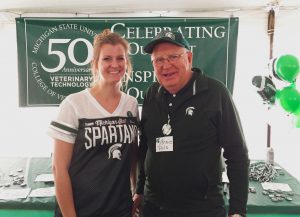
A year ago, the MSU College of Veterinary Medicine’s Veterinary Technology Program celebrated its 50th Anniversary. The Program has been through many changes since it was established in 1968 and will soon experience another major change.
When it began, the Program was non-degree-granting and administered through the Center for Laboratory Animal Resources. It focused on laboratory animal medicine and didn’t shift the focus to clinical veterinary practice until years later in the 70s. From that point on, veterinary technology students received their clinical training in conjunction with veterinary medical students and participated in the same clerkships—a practice that continues today.
The Program was re-organized to meet the American Veterinary Medical Association (AVMA) requirements in 1973 and was accredited by the Committee on Veterinary Technician Education and Activities. It was the first of two programs in the country to be accredited by the AVMA, and has retained full, unbroken accreditation to this day.

In 1992, the Program was recognized by the College as a distinct academic department. In addition, the College entered a consortia agreement with Lansing Community College (LCC) that resulted in the conferral of an Associate’s Degree in Applied Science from LCC and a Certificate of Completion in Veterinary Technology from MSU. In 1994, the curriculum was adapted to meet MSU requirements for a Bachelor of Science degree.
With all the changes to the Program, improving student experience and education remain the program administrators’ primary concerns. “Our program has high standards,” says Taylor Epp, director of the Program. According to Epp, the Program is dedicated to guiding students through active exploration of career options with both curricular and non-curricular means. “We work to assist students in meeting those standards by creating more flexible learning options and strengthening student support systems,” she says.
“We are working to elevate veterinary nursing and bring it into expanding areas of veterinary medicine, such as animal agriculture and telemedicine.”
The Program is working toward national prominence, making the College a leader in veterinary technology education in a fast-changing, modern world. “We are working to elevate veterinary nursing and bring it into expanding areas of veterinary medicine, such as animal agriculture and telemedicine,” says Epp.
As part of these leadership efforts, and in light of the Veterinary Nursing Initiative, the Program is now set to undergo a new change. In Spring of 2020, the Veterinary Technology Program will change its name to the Veterinary Nursing Program.
This name change, recently approved by MSU Academic Governance, underscores the College and the Program’s dedication to think ahead and shape the future of the profession. Licensed veterinary technicians often face challenges due to a misaligned and outdated title, which does not represent the depth and breadth of knowledge the profession demands.
By changing the title of the Program, the College aims to better serve its students and prepare them for an ever-changing and demanding profession. “We strive to empower students,” says Epp. “We are dedicated to the creation of highly sought-after, career-ready graduates who exceed expectations.”
Veterinary Nurse Initiative
The goal of the Initiative is to standardize the credential for the veterinary nursing profession in terms of requirements, title, and scope of practice across the country. The title “veterinary technician” does not represent the skillset and knowledgebase of those who hold it and has become a barrier to public understanding. This barrier serves as the impetus for the Initiative, the goal of which is to unify our profession and clearly represent our role in veterinary care to the public.
For more information about the Veterinary Nurse Initiative, read the National Association of Veterinary Technicians in America’s FAQ. It is in the best interests of everyone in the veterinary profession to become informed on this topic.
Jolynne Judge, MA, LVT, has previously written about this topic and the evolving Veterinary Nurse Initiative for National Veterinary Technician Week in 2017 and 2018.
